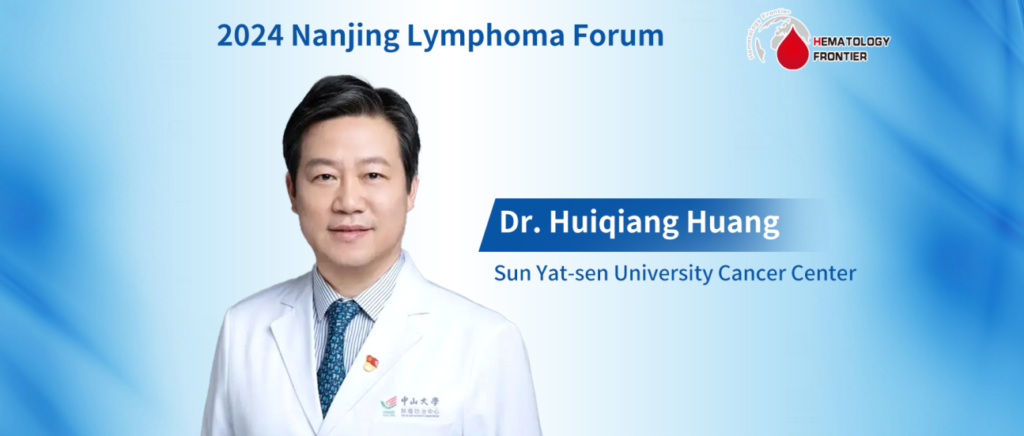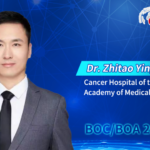
Editor's Note: In the realm of immunotherapy for lymphoma, PD-1/PD-L1 antibody combination therapies have emerged as a prominent area of research due to their precise modulation of the immune response. These therapies hold immense potential for enhancing efficacy and ensuring safety, providing lymphoma patients with more treatment options and the possibility of improved quality of life and prognosis. At the recent "2024 Nanjing Lymphoma Forum," Dr. Huiqiang Huang from the Sun Yat-sen University Cancer Center delivered an outstanding presentation titled "Advances in Immunotherapy for Lymphoma: Clinical Exploration of PD-1/PD-L1 Antibody Combination Therapies." Following the forum, "Oncology Frontier - Hematology Frontier" invited Dr. Huang for an interview to share further insights on this topic.Oncology Frontier – Hematology Frontier: PD-1/PD-L1 antibodies, as emerging immunotherapies, have achieved significant results in treating various tumors. How effective is PD-1/PD-L1 monotherapy in treating lymphomas?
Dr. Huiqiang Huang: Immunotherapy is a broad and rapidly advancing field. From the early use of CD20 antibodies to the current PD-1 antibodies, we have witnessed significant milestones. Today, we also have bispecific antibodies, ADC drugs, and CAR-T cell therapies, all contributing to the advancement of hematological malignancies and cancer treatment overall. In evaluating any treatment, including immunotherapy, we must consider its efficacy, safety, and accessibility. Several PD-1/PD-L1 drugs are already available in China, both domestic and international brands, providing excellent opportunities for in-depth research. PD-1 monotherapy has been approved for several indications worldwide, including lymphomas. For instance, PD-1 monotherapy has shown promising results in relapsed/refractory Hodgkin lymphoma. Additionally, we have observed the potential of PD-1/PD-L1 therapy in treating large B-cell lymphoma and NK/T-cell lymphoma. However, the efficacy rate and quality of remission with monotherapy still need improvement. Both doctors and patients hope for better remission rates, longer remission durations, and lower toxicity. Therefore, this field warrants further exploration, and we have conducted numerous related clinical and basic research studies over the years.
Oncology Frontier – Hematology Frontier: What are your thoughts on combining PD-1/PD-L1 antibodies with other therapies, such as chemotherapy or targeted therapy, for treating lymphomas? Can you share any successful combination therapy cases?
Dr. Huiqiang Huang: Combination therapy is an excellent method to enhance immunotherapy efficacy. We saw the benefits of combination therapy during the chemotherapy era, and it remains effective in the immunotherapy era. Tumors are highly heterogeneous, and no single method can completely overcome this heterogeneity or eliminate all tumor clones. Therefore, combination immunotherapy has been extensively explored in basic research. For example, PD-1 antibodies have synergistic effects with radiotherapy, chemotherapy, and various targeted therapies such as Bruton’s tyrosine kinase (BTK) inhibitors and epigenetic drugs. We need to explore which combination therapy works best for different patients at various treatment stages. While we cannot provide definitive answers yet, ongoing research aims to identify optimal combinations to enhance efficacy while ensuring safety and cost-effectiveness.
Hodgkin lymphoma is a good example of successful combination therapy. PD-1 monotherapy is effective, but combining it with chemotherapy, CD30 antibodies, or even transplantation can further improve outcomes. In NK/T-cell lymphoma, standard treatments like radiotherapy, chemotherapy, and drugs like pegaspargase or asparaginase are not always ideal, especially for advanced patients. Chemotherapy addresses about 50% of cases, but even with autologous transplantation, approximately 40% of patients relapse. While PD-1 therapy shows some efficacy, it is not sufficient alone. Therefore, combination therapy is essential.
We have explored combining PD-1 antibodies with chemotherapy and epigenetic drugs. In NK/T-cell lymphoma, epigenetic abnormalities are common poor prognostic factors. Overcoming these abnormalities can improve efficacy. Preclinical studies have shown that combining PD-1 antibodies with epigenetic drugs reduces T-cell exhaustion, decreases Treg cells, increases mesenchymal stem cell expression, and enhances NK cell activity. We treated 36 patients with NK/T-cell lymphoma using PD-1 antibodies combined with chidamide, with a median follow-up of 3 to 4 years. The overall response rate was nearly 60%, with a complete remission (CR) rate of almost 50%, and long-lasting remission in some patients. This was achieved without high-intensity chemotherapy or autologous transplantation, demonstrating the potential of chemo-free combination therapy.
In elderly patients with diffuse large B-cell lymphoma, chemotherapy alone often fails to improve outcomes. Basic research supports using PD-1 antibodies to address this issue. We combined PD-1 antibodies with CD20 antibodies as part of first-line treatment, sequencing them with R-CHOP to avoid adverse reactions from simultaneous use. The response rate with PD-1 and CD20 antibodies alone reached about 60%, with a CR rate of 50%. Transitioning to standard R-CHOP therapy further improved outcomes. Overall, immunotherapy combined with R-CHOP shows promise in enhancing efficacy and overall survival.
Oncology Frontier – Hematology Frontier: The synergy between epigenetic regulation and PD-1 antibodies offers new avenues for lymphoma immunotherapy. What do you see as the future prospects for combining PD-1 antibodies with histone deacetylase (HDAC) inhibitors in lymphoma treatment?
Dr. Huiqiang Huang: As mentioned earlier, due to the high heterogeneity of tumors, no single drug can fully conquer all patients’ tumors, including CAR-T and bispecific antibodies. Each treatment has its limitations and cannot achieve 100% efficacy for all patients. Current data suggest that immunotherapy combined with epigenetic modulation can indeed benefit some patients. However, we need to further explore which patients will respond to this combination and which will not. This patient stratification will help optimize treatment plans. I believe this approach could become a solution for relapsed and refractory patients, particularly elderly patients with slow disease progression, offering a unique “Chinese solution.” While this field may not be as popular as bispecific antibodies or ADCs, it remains significant to identify new combinations, patterns, and outcomes from existing drugs. I hope lymphoma and hematology doctors will pay attention to this field and try these approaches for patients in need.
Oncology Frontier – Hematology Frontier: Although PD-1/PD-L1 antibody combination therapies show potential in lymphoma treatment, immune-related adverse events (irAEs) remain a concern. How do you balance efficacy and safety when exploring combination therapies? What methods or recommendations do you have for reducing irAEs?
Dr. Huiqiang Huang: Managing adverse reactions is crucial in treating hematological malignancies and lymphomas. Any treatment must be effective, accessible, and safe. If safety cannot be ensured, it is challenging to promote any treatment regimen, no matter how effective it is. Immune-related adverse events (irAEs) are a common issue with immunotherapies, including CAR-T and bispecific antibody therapies, especially when combined with PD-1 treatment. For example, patients with high tumor burden or “B” symptoms, particularly those with T-cell lymphomas, may experience high fever or cytokine release syndrome (CRS) when treated with PD-1 antibodies.
In such cases, we use appropriate medications to control adverse reactions, such as steroids or anti-interleukin antibodies like tocilizumab. In treating NK/T-cell lymphoma, if patients develop fever during the two cycles of PD-1 treatment, we use steroids for short-term control. If the fever does not improve after two cycles and no therapeutic benefit is observed, we consider the immunotherapy regimen ineffective and discontinue its use. This does not mean steroids cannot be used during PD-1 treatment. We adjust strategies based on specific situations. With the development of less toxic drugs like PD-L1 antibodies, these immune-related adverse events may decrease in the future.
Overall, immunotherapy has its unique characteristics that require careful study to master. Once understood, it can bring significant benefits, and subsequent safety is relatively high. The key is close monitoring and management during the initial cycles. So far, we have not had any treatment-related deaths among our patients. Although some patients have experienced adverse reactions like interstitial pneumonia, we have managed them effectively and continued treatment with dose adjustments. For third-line and beyond relapsed and refractory patients, any treatment carries risks, including chemotherapy. Experienced clinicians can usually manage adverse reactions well, ensuring overall safety is controllable.
Dr. Huiqiang Huang
Chief Physician and PhD Supervisor Board Member of the Chinese Association for Elderly Health Chairman of the Lymphoma Professional Committee of the Chinese Association for Elderly Health Chairman of the Lymphoma Professional Committee of the Guangdong-Hong Kong-Macao Greater Bay Area of the China Primary Health Care Foundation Vice Chairman of the CSCO China Lymphoma Alliance Vice Chairman of the Lymphoma Professional Committee of the Chinese Anti-Cancer Association Vice Chairman of the Hematologic Tumor Integrated Rehabilitation Professional Committee of the Chinese Anti-Cancer Association Chairman of the Youth Committee of the Lymphoma Professional Committee of the Chinese Anti-Cancer Association Honorary Chairman of the Hematologic Tumor Professional Committee of the Guangdong Anti-Cancer Association Standing Committee Member of the Hematologic Tumor Professional Committee of the Chinese Anti-Cancer Association Honorary Chairman of the Lymphoma Professional Committee of the Guangdong Anti-Cancer Association P-Gemox and DA-EPOCH treatments for NKT lymphoma have been recommended by the NCCN guidelines in the United States. In recent years, he has published multiple papers as the first or corresponding (co-corresponding) author in international journals, including JCO, Lancet Oncology, Nature Medicine, JHO, Haematologica, Molecular Cancer, Cancer Communication, and STTT.


